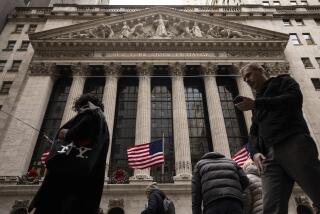Economy’s slight shrinkage late last year surprises experts
WASHINGTON — The economy’s unexpected contraction at the end of last year showed that “fiscal cliff” fears and a sharp drop in defense spending pushed the moderate recovery off track, highlighting the precarious nature of the country’s economic revival.
The nation’s total economic output shrank at an annual rate of 0.1% in the last three months of the year, the first such pull-back since the Great Recession ended in mid-2009, the Commerce Department said Wednesday.
Economists were surprised but predicted the drop was a temporary detour that would not send the U.S. veering toward another recession. They pointed out, however, that battles in Washington, including upcoming ones on spending cuts and the debt limit, again could affect consumer and business confidence and economic growth.
Among the factors for the fourth-quarter decline was a 0.6% drop in investments by businesses in their inventories amid concerns about the large tax increases and federal spending cuts — dubbed, collectively, the fiscal cliff — that had been set to start Jan. 1.
In addition, federal defense spending dropped 22.2% from the previous quarter, the biggest decline in four decades. And with Europe in recession and growth in China slowing, exports decreased 5.7%.
Two straight quarters of contraction officially constitute a recession, which would seem to put the U.S. on the precipice of another downturn. But economists said things were not as bad as they seemed.
Some of the key factors in the fourth-quarter slowdown, particularly the falloff in defense spending, appeared to be anomalies. A last-minute deal in Washington avoided most of the tax increases, providing a potential springboard for business investment.
And some key components of the economy, particularly consumer spending and the housing market, showed strength at the end of last year. Such factors should help ease any concerns about falling into another recession.
“I’m sure we will start seeing the use of the dreaded ‘R’ word,” said Justin Wolfers, an economics professor at the University of Michigan and fellow at the Brookings Institution. “That’s premature, and almost certainly wrong.”
Wolfers said the economy still is growing, but he warned that the “recovery is still precarious, and Congress could still blow it up.”
Economists had been expecting economic growth to slow from the 3.1% annual rate in the third quarter, but not into negative territory. The consensus estimate had been for 1% growth in the last three months of the year.
Amid the slowdown, the Federal Reserve said Wednesday that it would keep short-term interest rates near zero and continue its latest bond-buying stimulus program.
After a two-day meeting, Fed policymakers said recent information “suggests that growth in economic activity paused in recent months, in large part because of weather-related disruptions and other transitory factors.” Those disruptions included last summer’s drought and last fall’s Superstorm Sandy.
But the Fed said the economy has continued to add jobs at a “moderate pace” and it did not indicate it was preparing any new initiatives. On Friday, the government is expected to report the 35th consecutive month of private-sector job gains, a report that could indicate whether the fourth-quarter contraction was a harbinger of problems or a blip in the recovery.
Economists estimated that the economy added about 165,000 jobs in January, up from 155,000 in December, and that the unemployment rate remained at 7.8%.
A monthly survey by payroll processor Automatic Data Processing Inc., released Wednesday, showed the private sector added about 192,000 jobs this month, up from a revised 185,000 in December.
Investors appeared not to be overly concerned about the prospect of another recession. The Dow Jones industrial average fell 44 points, or 0.3%, to 13,910.42 on Wednesday.
“I don’t think anything has fundamentally changed in the economy,” said Mark Zandi, chief economist for Moody’s Analytics. “The economy is growing.”
He predicted the economy’s fourth-quarter performance would end up in positive territory after the government revises the data over the next two months.
Bernard Baumohl, chief global economist at Economic Outlook Group, said he was advising the firm’s clients to disregard the fourth-quarter report. He projected the economy would grow at an annual rate of 2.2% to 2.5% in the first three months of this year.
“All the economic indicators that underpin household and business spending are moving in the right direction,” Baumohl said.
Still, the expiration of the two-year payroll tax break Jan. 1 is expected to be a drag on consumer spending as workers adjust to smaller paychecks. And large automatic government spending cuts, delayed until March 1 to give the White House and Congress more time to work out a deficit-reduction deal, also could slow growth.
The importance of federal spending to the economy was clear in the fourth quarter. After a 12.9% increase in defense spending helped boost the economy in the third quarter, the big decrease in the fourth quarter helped drag growth into negative territory. The drop reduced economic growth by 1.28 percentage points, the Commerce Department said.
“A likely explanation for the sharp decline in federal defense spending is uncertainty concerning the automatic spending cuts that were scheduled to take effect in January,” said Alan Krueger, chairman of the White House Council of Economic Advisors.
The report was “a reminder of the importance of the need for Congress to act to avoid self-inflicted wounds to the economy,” he said.
But the drop in defense spending probably came because the Pentagon pulled some spending into the last fiscal year, which ended Sept. 30, said Gordon Adams, a professor of international relations at American University. He also said the gradual end to the war in Afghanistan was reducing military spending.
Times staff writer Alana Semuels contributed to this report.







